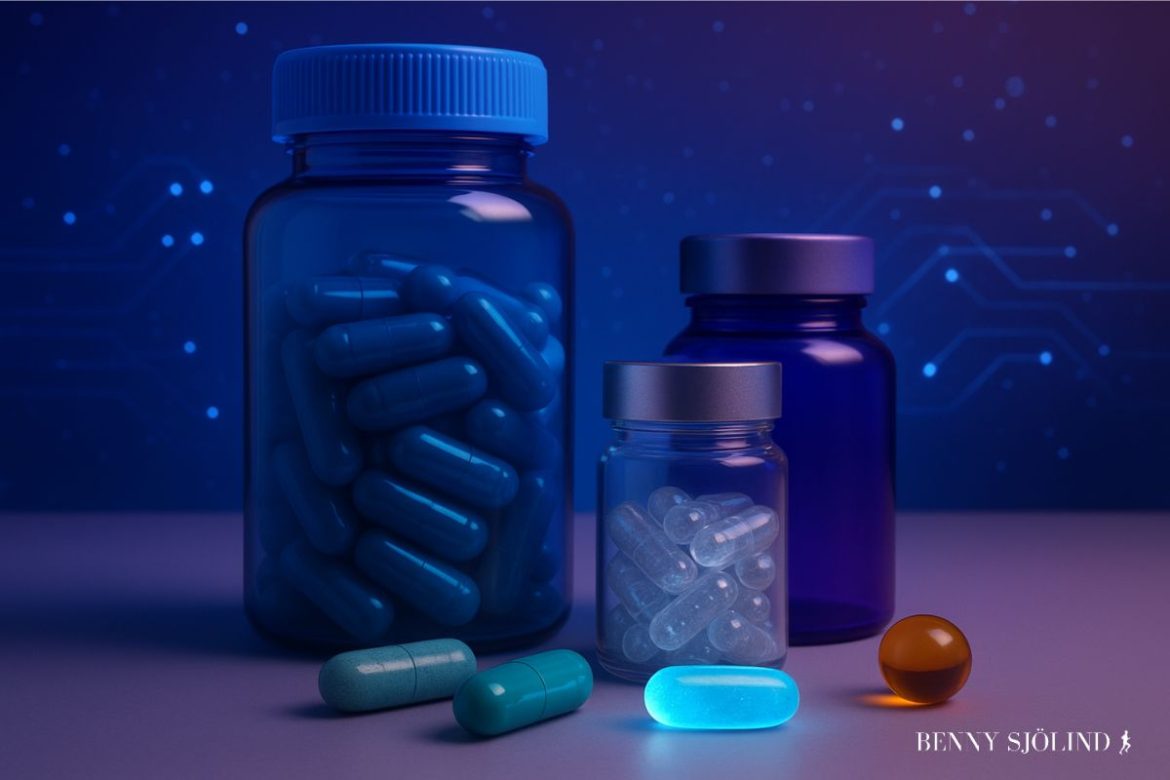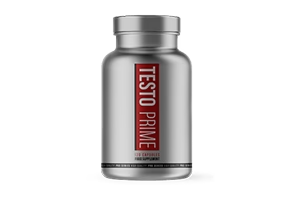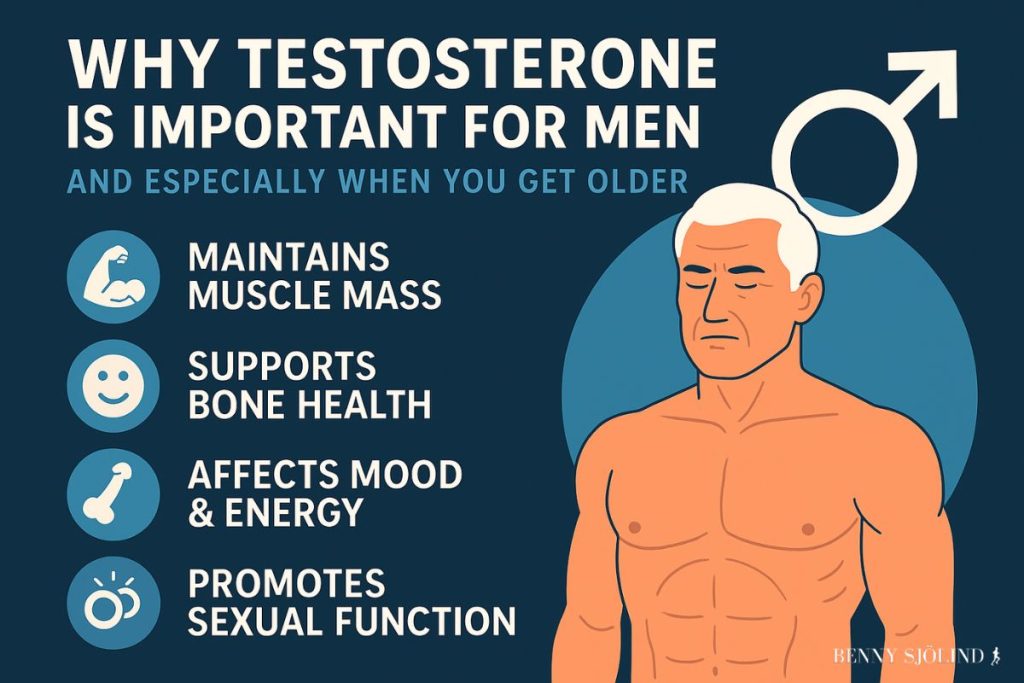Testosterone is much more than just a “male sex hormone.” It affects everything from muscles and energy to mood, sex drive, and brain capacity.
For men over 40, it plays a particularly important role – and understanding its function is key to maintaining both vitality and quality of life.
In this article, we’ll go over why testosterone is so important for men as they age, what signs to look out for, and natural ways to keep levels balanced.
Best Testosterone Supplements – My Picks:
What is Testosterone – And Why Does it Decrease with Age?
Testosterone is mainly produced in the testicles and regulates:
- Muscle mass and strength
- Energy levels
- Libido and sexual function
- Mental focus and mood
- Bone strength and metabolism
After the age of 30–35, testosterone levels naturally decrease by approximately 1–2% per year. This decline is slow, but over time it can lead to noticeable changes in how you feel – both physically and mentally.
Here you can read more about what testosterone is and how it affects your health.
Symptoms of Low Testosterone in Men over 40
Many men do not notice the change until it affects their daily lives. Here are some common signs:
- Fatigue & lack of energy Constant tiredness despite adequate sleep
- Reduced sex drive Lower libido, poorer erections
- Difficulty building muscle Loss of muscle mass despite exercise
- Increased abdominal fat, especially around the waist
- Depression & anxiety Reduced zest for life and increased irritability
- Poor focus & memory Mental fog, difficulty concentrating
- Lower self-esteem Reduced motivation and drive
Why Testosterone is Especially Important after 40
Here are some of the reasons why testosterone is so important for you as you get older, especially after 40:
1. For muscle mass and fat burning
Testosterone regulates protein synthesis and helps the body build and maintain muscle. Decreased levels often lead to increased fat storage, especially around the abdomen.
2. For energy and recovery
Testosterone affects the mitochondria – the body’s “power plants.” Low levels can therefore lead to reduced endurance and slower recovery after exercise.
3. For sexual health
Both libido and erectile function are directly affected by testosterone levels. Many men experience reduced sexual function as one of the first signs of imbalance.
4. For mental acuity and stability
The hormone affects neurotransmitters such as dopamine and serotonin. A deficiency can lead to anxiety, depression, difficulty concentrating, and a feeling of having lost your spark.
5. For bone health and long-term stability
Testosterone helps maintain strong bones. A deficiency can increase the risk of osteoporosis in the long term – something that also affects men.
Natural ways to increase testosterone – without medication
There are several lifestyle factors and dietary supplements that can support the body’s natural testosterone production:
1. High-intensity strength training
I have cut back on running and am focusing more on strength training as I approach 50. I also include rowing in my weekly schedule and usually row every other day and run every other day.
- Heavy strength training (especially basic exercises) increases testosterone levels immediately
- Sprint training and HIIT can also be effective
2. Sleep: at least 7–8 hours per night
When it comes to sleep, this is something I have started to prioritize more and more. I usually eat light in the evening, often just a green smoothie and eggs, so that my body doesn’t have to work so hard to digest food while I sleep.
- Testosterone production mainly occurs during deep sleep
- Chronic sleep deprivation = hormonal disaster
3. Diet: Eat for hormonal balance
Avoid processed foods and try to eat as clean as possible. I generally avoid meat and milk in my diet. Make sure you get enough:
- Zinc (meat, pumpkin seeds)
- Magnesium (spinach, almonds)
- Vitamin D (sun, fatty fish, supplements)
- Healthy fats (eggs, avocado, olive oil)
4. Manage stress
This is often easier said than done, but deep breathing exercises and massage devices have helped me a lot with relaxation:
- High cortisol levels lower testosterone
- Meditation, walks in nature, breathing exercises
5. Avoid hormone disruptors
When I arrived in Malta, I went a little overboard, especially with alcohol. After all, you live on a Mediterranean island where enjoyment is part of life. Over time, however, I have learned to choose my moments. Here are a few things to avoid:
- Plastic packaging (BPA)
- Excessive alcohol
- Excess weight (abdominal obesity in particular contributes to estrogen dominance)
Supplements that can support testosterone levels naturally
| Supplement | Effect |
|---|---|
| D-vitamine | Supports hormone production |
| Zink | Contributes to testosterone biosynthesis |
| Magnesium | Promotes recovery and sleep |
| Ashwagandha | Lowers cortisol, supports libido |
| Pine | Has been shown in studies to increase free testosterone |
| Tongkat Ali | Adaptogen that can increase testosterone & libido |
When should you check your testosterone levels?
If you experience several of the symptoms above – especially fatigue, reduced sex drive, abdominal obesity, or depression – it may be wise to book a blood test. There are also home tests for testosterone that can give you an indication.
Conclusion – You can influence more than you think
Testosterone is not just a hormone – it is a key to male vitality, drive, and well-being.
And although levels decline with age, there is a lot you can do to maintain balance – without resorting to medication right away.
Taking care of your hormone health is not vain. It is proactive health for a strong, clear, and powerful life – even long after 40.









